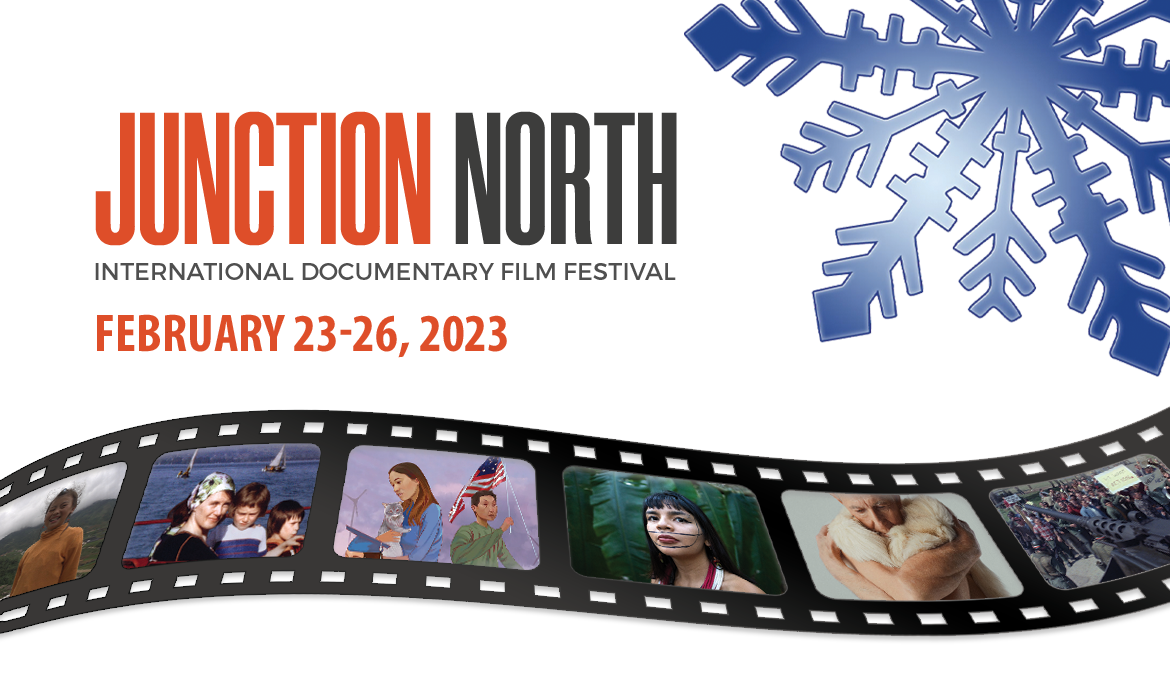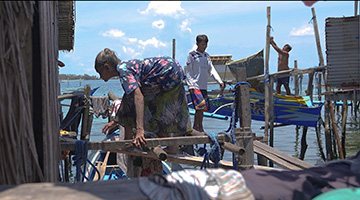
Junction North
INTERNATIONAL DOCUMENTARY FILM FESTIVAL
Sudbury Downtown Indie Cinema Co-op is delighted to announce our 6th edition of Junction North International Documentary Film Festival, Thursday February 23rd to Sunday February 26, in downtown Sudbury. This is possible due to the stellar support of our keen local audiences of doc-lovers, filmmakers, patrons, sponsors and government partners.
Junction North brings Northern Ontario non-stop screenings over 4 days of the year's outstanding stories from around the world.
All screenings will take place at Indie Cinema 162 Mackenzie Street, Sudbury - laneway entrance. Free parking.
TICKETS and FESTIVAL PASSES on sale now!
Download the JNFF 2023 schedule here.
Northern Ontario Premiere
Riotsville, U.S.A.
by Sierra Pettengill
Thursday February 23 4:00 pm / Friday February 24 12:00 pm
2022 Documentary USA 91 minutes
11 wins/nominations including nominations from Sundance, Critic’s Choice Documentary Awards, and Film Independent Spirit Awards
In the wake of mid-1960s popular uprisings in Newark, Watts and Detroit, the United States Armed Forces constructed two fake towns on the sites of former plantations for use as training grounds to equip troops against future civil disobedience. Dubbed "Riotsville," the towns and their training were an important moment in the emergence of a more militarized American police force over the subsequent six decades. Following a string of rich shorts constructed out of sourced material, Sierra Pettengill's electric feature debut borrows from broadcast footage and government film archives to situate the training sessions alongside other key moments, including the infamous 1968 Democratic National Convention in Chicago and that year's less-discussed Republican National Convention in Miami.
OPENING FEATURE
Northern Ontario Premiere
The Territory
by Alex Pritz
Thursday February 23 6:30 pm
2022 Documentary Brazil 86 minutes
2023 Oscars’ Shortlist Best Documentary Feature
45 wins/nominations including 2 wins at Sundance 2002 for Audience Choice and World Cinema Special Jury Prize
The Territory provides an immersive on-the-ground look at the tireless fight of the Indigenous Uru-eu-wau-wau people against the encroaching deforestation brought by farmers and illegal settlers in the Brazilian Amazon. With awe-inspiring cinematography showcasing the titular landscape and richly textured sound design, the film takes audiences deep into the Uru-eu-wau-wau community and provides unprecedented access to the farmers and settlers illegally burning and clearing the protected Indigenous land. Partially shot by the Uru-eu-wau-wau people, the film relies on vérité footage captured over three years as the community risks their lives to set up their own news media team in the hopes of exposing the truth.
Northern Ontario Premiere
Dear Jackie
by Henri Pardo
Thurday February 23 8:20 pm
2021 Canada 90 minutes French and English with English subtitles
Dear Jackie is a cinematic letter to Jackie Robinson, the first African American player in Major League Baseball and a civil rights activist who broke the colour barrier when he joined the minor-league Montreal Royals in 1946. For a short time, the impossible seemed possible in a segregated North America. But did Montrealers use this historic moment to perpetuate a myth of a post-racial society?
Through eloquent interviews, archival footage, and powerful vérité moments shot in lustrous black and white, director Henri Pardo masterfully threads together fragments of the past with the present-day realities of Little Burgundy, once known as the “Harlem of the North”. Dear Jackie unfolds as an intimate correspondence with Robinson that unravels the myth of a post-racial society, and is a testament to the triumphs and resilience of a community whose stories reveal the insidious racial inequalities in Montreal and Quebec as a whole.
Northern Ontario Premiere
Turn Every Page
by Lizzie Gottlieb
Friday February 24 2:00 pm / Sunday February 26 12:00 pm
2022 USA 112 minutes
4 wins/nominations including winner National Board of Review, Top Five Documentaries Award
Turn Every Page explores the remarkable fifty-year relationship between two literary legends, writer Robert Caro and his longtime editor Robert Gottlieb. Now 86, Caro is working to complete the final volume of his masterwork, The Years of Lyndon Johnson; Gottlieb, 91, waits to edit it. The task of finishing their life’s work looms before them. With humor and insight, this unique double portrait reveals the work habits, peculiarities and professional joys of these two ferocious intellects at the culmination of a journey that has consumed both their lives and impacted generations of politicians, activists, writers, and readers.
Northern Ontario Premiere
All That Breathes
by Shaunak Sen
Friday February 24 4:15 pm
2022 UK/India/USA 97 mins
2023 Oscar Nominee Documentary Feature Film
19 wins and 35 nominations including Best Documentary at Sundance and Cannes 2022
In one of the world’s most populated cities, two brothers — Nadeem and Saud — devote their lives to the quixotic effort of protecting the black kite, a majestic bird of prey essential to the ecosystem of New Delhi that has been falling from the sky at alarming rates. Amid environmental toxicity and social unrest, the ‘kite brothers’ spend day and night caring for the creatures in their makeshift avian basement hospital. Director Shaunak Sen (Cities of Sleep) explores the connection between the kites and the brothers who help them return to the skies, offering a mesmerizing chronicle of inter-species coexistence.
Northern Ontario Premiere
Bad Axe
by David Siev
Friday February 24 6:15 pm
2022 Documentary USA 100 minutes
2023 Oscars’ Shortlist Best Documentary Feature
31 wins/nominations including Mountain Film Festival Grand Prize winner for Best Feature Documentary and a Sierra Award for Best Documentary
Bad Axe captures a closely-knit Asian American family living in rural Michigan during the pandemic as they fight to keep their local restaurant and American dream alive. With rising racial tensions, the family uses their voice and must unite as they reckon with backlash from a divided community, white supremacists, and intergenerational trauma from Cambodia's "killing fields."
Northern Ontario Premiere
Hidden Letters
by Violet Du Feng, Qing Zhao
Friday February 24 8:20 pm
2022 USA/China/Norway 86 minutes
2023 Oscars’ Shortlist Best Documentary Feature
12 wins/nominations including Heartland International Film Festival Grand Prize and winner of Best Norwegian Documentary
Women in China were historically forced into oppressive marriages and forbidden to read or write by their households for thousands of years. To cope, they developed and shared a secret language among themselves called Nushu. Written in poems or songs with bamboo pens on paper-folded fans and handkerchiefs, these hidden letters bonded generations of Chinese women in a clandestine support system of sisterhood, hope and survival.
Spanning between past and present, from sunken rice fields and rural villages to bustling metropolitan cities, Hidden Letters follows two millennial Chinese women who are connected by their fascination with Nushu the secret language of sisterhood and their desire to protect its legacy.
Northern Ontario Premiere
Category Woman
by Phyllis Ellis
Saturday February 25 11:00 am
2022 Canada 80 minutes
When 18-year-old South African runner Caster Semenya burst onto the world stage in 2009, her championship was not celebrated, but marred by doubt, her personal medical records leaked to the international media. The public scrutiny of her body, driven by racism and sexism, brought into question the most fundamental aspect of who she is: a great champion.
The International Amateur Athletics Federation (now World Athletics) ruled that certain female athletes must medically alter their healthy bodies in order to compete, and their naturally high androgen levels were deemed a performance advantage. Category Woman follows four athletes forced out of competition by regulations that profile and target women athletes, and the subsequent devastation to their bodies, and livelihoods. But these individuals are emboldened by a conviction to stand up against this violation of their human rights. Following up on her award-winning film TOXIC BEAUTY, Phyllis Ellis exposes an industry controlled by men putting women’s lives at risk while this policing of women’s bodies in sport remains, in a more nefarious way, under the guise of fair play.
Northern Ontario Premiere
Boylesque
by Bogna Kowalczyk
Saturday February 25 1:00 pm with filmmaker Q & A
2022 Documentary Poland, Czech Republic 70 minutes
Winner Jury Award for Best International Feature, Hot Docs 2022
At 82 years old, Lula is every inch the rebel. An openly gay man in communist Poland, he organized underground parties and after-curfew salons of men inside private apartments. He enthusiastically took up drag, despite a fiercely homophobic culture, to free himself from the stifling correctness of the 80s. But now, he's an old, single man in a youth-obsessed world. His friend was crushed by depression and killed himself, but somehow Lula, now Poland's oldest drag queen, remains buoyant. Is he escaping loneliness with his constant clubbing, looking for love yet again to insulate himself against what he knows is coming? Lula isn't waiting for approval. Filmmaker Bogna Kowalczyk's energetic portrait pairs with her subject's kinetic drive, right down to the stellar soundtrack and nimble camerawork. Whether it's meeting fans at Pride or selecting an artist to sculpt his specialty crematorium urn, try to keep up with a man who knows life is to be lived out loud.
All The Beauty and The Bloodshed
by Laura Poitras
Saturday February 25 3:00 pm with 20 minute panel
2022 USA 122 minutes
2023 Oscar Nominee Best Documentary Feature
62 wins/nominations including Winner of the Golden Lion at the Venice Film Festival 2022 and a Golden Athena Award for Best Documentary
Directed by Academy Award®-winning filmmaker Laura Poitras, All The Beauty and The Bloodshed is an epic, emotional and interconnected story about internationally renowned artist and activist Nan Goldin told through her slide shows, intimate interviews, ground-breaking photography, and rare footage of her personal fight to hold the Sackler family accountable for the overdose crisis.
Northern Ontario Premiere
Ever Deadly
With Q&A with Tanya Tagaq
by Chelsea McMullan, Tanya Tagaq
Saturday February 25 6:45 pm
2022 Canada 90 minutes
Winner of Audience Award for Best Canadian Documentary Feature at the 2022 Yellowknife Film Festival. Official Selection, Toronto International Film Festival
Northern Ontario Premiere
Children of the Mist
by Hà Lệ Diễm
Saturday February 25 8:45 pm
2021 Documentary Vietnam 92 minutes
2023 Oscars’ Shortlist Best Documentary Feature
25 wins/nominations including winner of Solden Silk Roar Award and winner for the Best International Film award from the DocAviv Film Festival
In a village hidden in the mist-shrouded Northwest Vietnamese mountains resides an indigenous Hmong community, home to 12-year-old Di, part of the first generation of her people with access to formal education. A free spirit, Di happily recounts her experiences to Vietnamese filmmaker Diễm Hà Lệ, who planted herself within Di's family over the course of three years to document this unique coming of age. As Di grows older, her carefree childhood gives way to an impulsive and sensitive adolescence, a dangerous temperament for what will happen next; in this insular community, girls must still endure the controversial but accepted tradition of "bride kidnapping." One night, when the young girl's parents return home from celebrating the Lunar New Year, they are shocked to find their house is silent: Di has disappeared.
LOCAL SHORTS Programme
VIP Guests in Attendance
Sunday February 26 at 10:30 am

Uncivilized
Canada 16 min. by Rawd Almasoud
After the Russian invasion of Ukraine, some mainstream media outlets compared refugees from Ukraine with those from third world countries, and questioning the latter's civility. We follow the lives of 4 Syrian refugees in Calgary.

On the Brink
Canada 8 min. by Jeremy Mathieu
Sea lice coming from fish farms in British Columbia are harming wild salmon to the brink of extinction.

Sama Dilaut
World Premiere
USA, 26 min. by Christine Ramos
Forced to surrender their nomadic life, an indigenous community that dwelled on houseboats for hundreds of years in the Sulu sea is affected by climate change and struggles to survive independent from the sea.

Dancing In the Doctor’s Office
Canada, 8 min. by Carly Nadine Stasrink
It is during vulnerable moments of fear and solitude in hospital waiting rooms and doctor’s offices, that Carly and her family reclaim a sense of power, place, hope and healing through dance and embodied creative expression.
Northern Ontario Premiere
Far Beyond The Pasturelands
by Maude Plante-Husaruk, Maxime Lacoste-Lebuis
Sunday February 26 2:15 pm
2021 Canada 84 mins Nepali with English Subtitles
2 wins Montreal International Documentary Festival in 2021, winner New Visions Award, Colin Low Award for Best Canadian Director.
In a remote Himalayan region, the villagers of Maikot are preparing for the harvest of a mysterious aphrodisiac caterpillar-mushroom worth more than gold. Lalita, a young mother, let go of her dreams after getting married because of the social pressures of her community. As the whole village departs to the mountains, she joins the journey to the high-altitude pasturelands in hope of providing a better life for her family through the hazardous harvest of the rare mushroom. Set against the backdrop of stunning mountainous landscapes, the film presents an intimate portrait of villagers who put everything on the line for a chance to ascend to greener pastures.
Northern Ontario Premiere
Les Années Super 8 / The Super 8 Years
by Annie Ernaux, David Ernaux-Briot
Sunday February 26 4:00 pm with 15 minute talk
2022 Documentary France 61 minutes
2 Cannes nominations Golden Eye and Lumiere Award for Best Documentary
En revoyant nos films Super-8 pris entre 1972 et 1981, il m’est apparu que ceux-ci constituaient non seulement une archive familiale mais aussi un témoignage sur les loisirs, le style de vie et les aspirations d’une classe sociale, dans la décennie qui suit 1968. » - Annie Ernaux. Présenté à la Quinzaine des Réalisateurs du Festival de Cannes le printemps dernier, Les Années Super-8 est un premier film coréalisé par Annie Ernaux et son fils David Ernaux-Briot. À travers ce fragment autobiographique croisant l’intime, le social et l’histoire, l’écrivaine française nous raconte la décennie la plus déterminante de sa vie, celle qui a fait d’elle l’une des plus grandes voix féministes de la littérature.
The French writer and 2022 Nobel Prize awardee Annie Ernaux, whose novels and memoirs have gained her a devoted following (autobiographical L’Événement was adapted just last year into the critically acclaimed film Happening), opens a treasure trove with this delicate journey into her family’s memory. Compiled from gorgeously textured home movie images from 1972 to 1981 – when her first books were published, her sons became teenagers, and her husband Philippe brought an 8mm film camera everywhere they went – this portrait of a time, place, and moment of personal and political significance takes us from holidays and family rituals in suburban bourgeois France to trips abroad. Supplying her own introspective voiceover, Ernaux and her co-filmmaker, her son David, guide the viewer through fragments of a decade, diffuse and vivid in equal measure. The Super 8 Years is a remarkable visual extension of Ernaux’s ongoing literary project to make sense of the mysterious past and the unknowable future.
Closing Feature
Ontario Premiere
Only In Theatres
by Raphael Sbarge
Sunday February 26 5:30 pm
2022 USA 93 minutes
In the 30s, two European Jewish immigrant brothers escaped fascist Germany right before World War II. They came to America and opened a movie theater. By the 1960’s, the dynamic Laemmle family owned and operated 6 theaters in the Los Angeles developing an outsized influence on cinema. Laemmle Theatres, the beloved 84-year-old arthouse cinema chain in Los Angeles, is facing seismic change and downward pressure. Yet the family behind this multigenerational business—whose sole mission has been to support the art of film—is determined to see it survive.
Over four generations, the Laemmles—a close-knit Jewish family—have dedicated themselves to supporting, innovating, and elevating the art of filmmaking. Responsible for bringing foreign film to Los Angeles, popularizing independent films, documentary films, and their makers, the Laemmle Theatres’ impact on Hollywood and world cinema cannot be overstated.
Today, in a world of conglomeration and streaming, as well as a pandemic, the Laemmle circuit of beloved theaters has faced unprecedented challenges. Filmed over two years, director Raphael Sbarge was given complete access, and editorial control, over this family’s most turbulent time in 85 years of doing business.
















